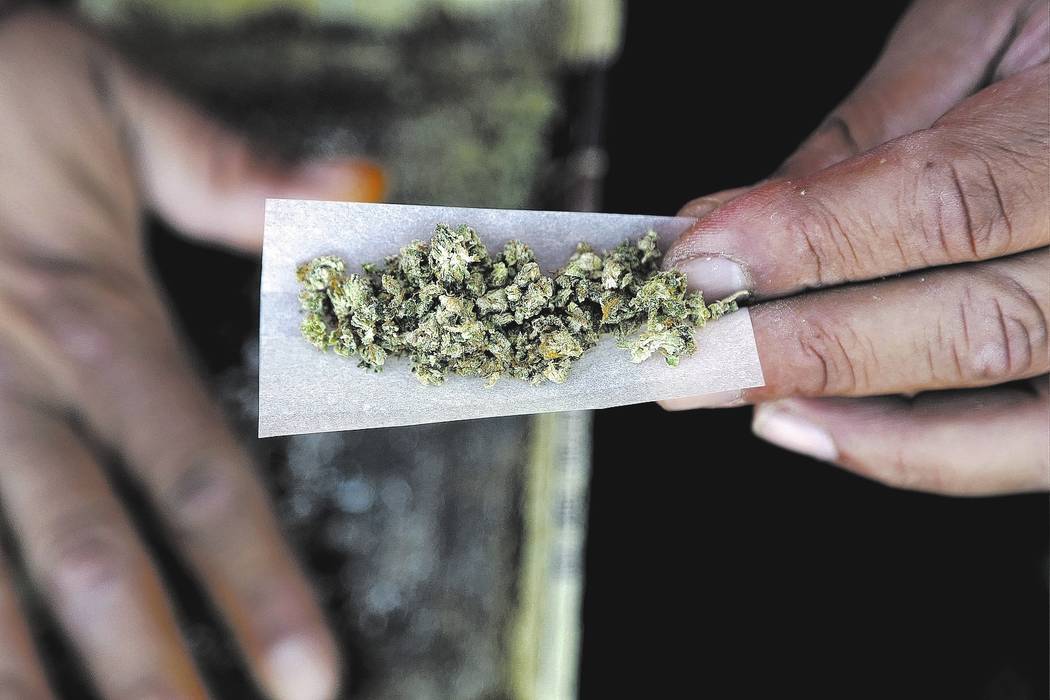COMMENTARY: Don’t let rush for profits obscure need to solid public safety regulations regarding legal marijuana
Last week, the Nevada Tax Commission voted to hurry the roll out of the state’s recreational marijuana program.
This, of course, is not what the pot industry promised. After the votes came in last Nov. 8, Yes on Question 2 spokesman Joe Brenzy said, “Now the work begins. We’ve got to work on the toughest regulations in the country and implement them in a socially responsible manner.” Instead, once industry members got a whiff of money, they moved the goalposts and rushed the process.
So it is not surprising that in less than two months, Nevada will be running to a self-imposed finish line for recreational pot with no understanding of how to protect public health and safety for kids, drivers and communities.
Why aren’t we slowing down, taking a breath and figuring out the common sense path forward? It’s not hard to understand the reasoning behind the industry’s rush: profits. This is about creating a new money-hungry industry a la Big Tobacco — except this time it’s Big Marijuana.
Rushing the roll-out of the recreational pot industry without structured rules will allow marijuana industry lobbyists to come in through the back door and determine their own guidelines. These special interests cheered as Nevada stifled debate and advanced marijuana commercialization, knowing that this would fast-track their own profits.
This is not surprising, especially because the marijuana and tobacco lobbies seem to be merging. Rob Kampia, executive director of the D.C.-based marijuana lobbying organization backing last year’s legalization campaign in Nevada, recently admitted to taking campaign money from tobacco industry operatives. Big money lobby groups such as Kampia’s are pouring profits into financing local and federal politicians, and encouraging them to fight sensible marijuana regulations tooth and nail. And if Big Tobacco can help them, they’ll gladly let them in on some of the money.
The last thing Nevada needs is to rush into a massive addictive industry advertising highly potent marijuana candy to kids and trying to bring back smoking in restaurants (like they did in Denver) or pot advertising on television (like they did in California).
Now that the state has given them the green light, this lobby will move to sidestep regulations at every turn.
But Nevadans and their elected leaders can take action to push back against these money-hungry special-interest groups looking to write their own regulations:
■ Empower public health voices: Seats on a future marijuana advisory committee should go to public health and safety advocates, not industry voices. We wouldn’t give Phillip Morris seats at the table for a tobacco regulation panel; why would we consider it for marijuana?
■ Monitoring the black market: A statewide law enforcement office that can measure black market and cartel activity is another important public safety protocol. This year in Oregon, a state police report showed that 70 percent of the state’s marijuana market is being illegally diverted. And in Colorado, Mexican cartel activity is filtering in as organized crime filings skyrocket. Gathering information on black-market activity will be critical, and we can be sure that marijuana industry lobbyists would otherwise sweep this information under the rug.
■ Edibles: Edibles and high potency concentrate products pose the most serious danger to public health, especially for kids. They resemble consumer products such as candy, soda and ice cream and should be heavily regulated.
■ Advertising restrictions: Underage users are a very profitable market for the pot industry, even if sales to minors are illegal. Early-onset users are more likely to become heavy users. The marijuana industry knows advertising is a crucial component to targeting and capturing customers, so advertising must be seriously restricted.
— Strict drugged-driving standards: States such as Colorado and Washington have shown us that there also need to be stringent standards for driving while high. The percentage of Washington state drivers involved in fatal crashes who recently used pot more than doubled after the state legalized the substance.
And in Colorado, pot is now involved in more than one of every five deaths on the road, and that number is rising.
Responsible leadership is the only thing standing between the next Big Tobacco in Nevada. We urge Nevadans and their representatives to demand accountability and common sense.
Kevin A. Sabet, Ph.D, is an author and former adviser to three U.S. presidential administrations. He is president and CEO of Smart Approaches to Marijuana (learnaboutsam.org), which he co-founded in 2013 with former U.S. Rep. Patrick Kennedy and David Frum, senior editor of The Atlantic.

















